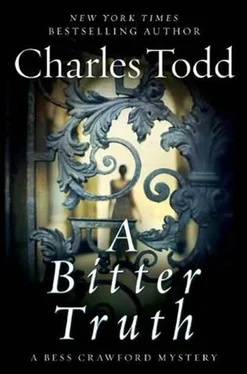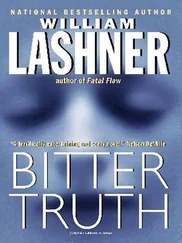I wondered if the tree he’d seen was actually just one of the logs that the Lanyon family had been delivering to Vixen Hill. And they’d come back to reclaim it.
After a lovely dinner, we took our tea in the drawing room in front of the fire, gathering under Juliana’s smiling portrait. I thought, George will be pleased .
When the men had finished their port and come to join us, George sat down across from me. His eyes were heavy, and I thought perhaps he was half asleep. Then he turned to me and asked, “You’re a nursing sister?”
“Yes.”
“God bless,” he said fervently. “You have no idea how much good you do.”
Gran looked up at that. “What did your father have to say about your decision to go into nursing?”
I knew she’d been wanting to ask me just that. In her day, women of good families didn’t nurse the ill and dying. Only the poorest of women, and even streetwalkers, were thought fit for such an occupation. Florence Nightingale had changed public opinion during the Crimean War about the role nurses could play in saving lives, but it was still not considered a proper profession until the death tolls in the present war made women of every class come forward to do what they could.
I smiled a little as I remembered my father’s opinion.
“If you wash out, don’t let it fret you. There are other ways to serve. Just remember that.” Whether he expected me to fail to qualify I didn’t know, but he was right, it was harder work than I’d ever expected it to be, and I’d had to face things that it would have been easier not to face, ever. I’d reminded myself every night when I went to bed that soldiers in the field were already enduring unspeakable conditions, and if I were truly my father’s daughter, I would stick to my guns and not retreat. In the end, I qualified, and felt a surge of pride that I hadn’t anticipated. This was my accomplishment. Being the Colonel’s daughter hadn’t smoothed my path, hadn’t made it less disgusting to take away bedpans and trays of bloody cloths or mop up vomit and other bodily fluids from the floor, or clean patients who were riddled with disease or covered in pus from suppurating wounds, hadn’t made the smells less nauseating, hadn’t stopped the sights from invading my dreams, or taught my poor stomach to accept food again after the most harrowing of amputations. It had only steeled my determination. Now I could look back on my training with a better understanding of what it was designed to forge in those of us who survived it. And I could measure just how far I had come.
But I answered her differently. “My father knew how much it meant to me to do my duty. And to his eternal credit, he didn’t stand in my way.”
“Indeed.” It was her only comment and could be interpreted in several ways.
Henry asked where I’d served, and I told him: Britannic, France, the Near East. He said, “You were on Britannic when she went down? Yes? That must have been harrowing.”
I said, “We had a good captain and a good crew. Most of us survived.”
We spoke of other things, and some little time later, I saw George lean over to say something to Roger. It was meant to be private, a quiet aside. Instead it happened to fall into one of those lulls that come at the end of an evening, when conversation is nearly at a standstill and people are about to take their leave and go home. Which meant we all heard him as clearly as if he had shouted the words from the rooftop.
“-daughter is the spitting image of Juliana. Did you realize that? For God’s sake, tell me, has she been found?”
We could have heard a pin drop twenty miles away, the silence that followed his words was so profound.
Roger sat as if nailed to his chair for all of several seconds. George had the grace to look embarrassed. The rest of us were sitting there with our mouths open. I shut mine smartly, prepared for anything. Out of the corner of my eye I could see Lydia’s expression: shock mixed with horror. She turned toward her husband, waiting for him to reply.
Whose daughter? That was the question in everyone’s mind. If she was the image of Juliana, then she must be Roger’s. Or Alan’s. And why was it necessary to find her?
Finally Roger said, “You’re drunk and maudlin, George. You should call it a night.”
Dr. Tilton stood, setting his teacup on the table beside him. “I’ll see him to bed, shall I? His usual room? Good.”
Roger Ellis stirred. His words to George had been clipped, the only outward sign of whatever emotion he was suppressing-anger, disgust, surprise. It was impossible to tell what he was feeling, but his eyes were so intensely blue that if they could have sparked, they would have. Turning to me, he said, “Miss Crawford, I hesitate to ask such a favor of a guest, but if you could assist Dr. Tilton, I’d be grateful.”
“By all means,” I answered, rising and praying that George wouldn’t vomit all over my pale green dress. He looked now as if he could be sick at any moment, his face gray. Or was that shame as his careless words finally sank in and he realized what he had done?
“I can manage,” he began, then nearly lost his balance as he rose from his chair.
Dr. Tilton and I each took an arm to help him to the door, but he caught us unprepared and pulled away, turning around to face everyone in the room.
“Malcolm isn’t here after all. I must have imagined he was. It was to him-to my brother-that I was speaking. I do apologize if I’ve upset anyone.” His eyes were quite sober now.
I remembered Roger mentioning earlier that Malcolm was George’s late brother. And it was obvious that the others also knew who Malcolm was. But even I could see the doubt in the faces turned toward us in the doorway. It was a polite lie intended to cover the truth. And it failed.
“Forgive me,” he added, and then let us lead him through the door.
As it was closing behind us, I heard Mrs. Ellis say, “Poor man. He hasn’t been the same since-” The rest of what she was about to say was cut off as the door shut with a soft click .
We got George to his room, where the lamps were already lit and the fire burning well on the hearth, thanks to the ubiquitous Daisy, and in short order we had him in his bed, leaning against pillows.
“I feel like an idiot,” he said to me as I smoothed the blanket we had pulled over his knees. Then he turned his gaze on Dr. Tilton. “I do talk to my brother sometimes, you know. A habit begun early in life and hard to break. We were close.”
Dr. Tilton said, “You mentioned a child who looked like Juliana. I thought your brother was dark.”
“Her mother was fair,” George responded quickly. “A Frenchwoman.”
But Dr. Tilton was not satisfied. “I thought most Frenchwomen were also dark.”
George smiled. “I can tell you that some are as fair as any Englishwoman. Miss Crawford can attest to that, I’m sure.” He looked to me for support.
I said to Dr. Tilton, “That’s true. Now I think we should rejoin the other guests.”
“Yes, yes, go on down. I’ll be with you shortly.” It was clear he would like to probe further into what Lieutenant Hughes had said. I was sure the family wouldn’t care for that, and Lydia had already warned me that he was a gossip.
I could understand, then, why Roger Ellis had asked me to accompany the doctor.
“Dr. Tilton. We have put Lieutenant Hughes to bed. That was our only charge.”
He looked up at me, on the point of telling me to mind my own business, when he must have realized that I was not simply a nursing sister but a friend and guest of Lydia’s. He wished Lieutenant Hughes a good night and added, “Send for me tomorrow if you feel unwell.”
Читать дальше












